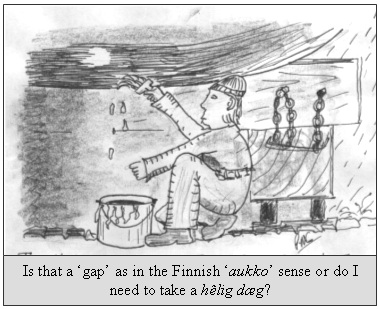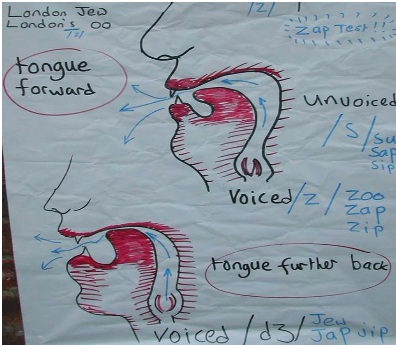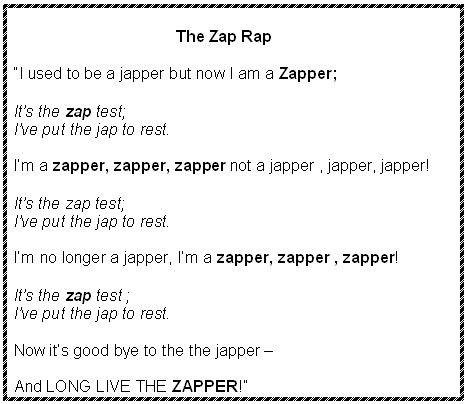The Holiday Detector
Peter Clements, UK
Peter teaches on Trinity Skills ESOL for Life courses at a range of levels as well as delivering exam preparation courses to CAE and CPE students in the Adult Education sector. During the summer months he teaches in a School of English in Canterbury where he enjoys meeting other teachers and benefiting from the wealth of creative ideas and experience of his colleagues.
E-mail: peter.clements@talktalk.net
Menu
A coat of paint
What a difference a phoneme makes
The japper / zapper problem …
‘Holiday’ detection and detecting the root of ‘holidays’

Applying a coat of toxic antifouling paint to the enormous hull of a ship hauled out of the water on a slipway, the apprentice didn’t give much thought to the etymological root of the phrase uttered by his foreman: “And I don’t want to see you leave no holidays.” Rolling his eyes amidst the cold, wet and dirty conditions on the slipway the thought of having a literal holiday seemed at that moment to have a certain appeal.
Little did this apprentice realise the significance of ‘holidays’ or gaps in this painted surface would be useful in understanding a process that be of significance in helping a number of Nepalese ESOL students with a pronunciation problem during lessons sponsored by their employer .
The pronunciation challenge first emerged when students were describing processes at work. A number of them mentioned that products had to go on a ‘japper’ to be tested or undergo a ‘jap-test’. I had not come across this term before and it was only when students wrote the word with a ‘z’ that it first became evident that they were not used to pronouncing the /z/ phoneme and that they were in fact referring to process used within the company know as a ‘zap test’. This refers to an electronic test carried out on plastic products to check for quality, consistency and to detect any flaws such as minute holes in the complex surface of the product. For most of these students, this regular part of their work routine was something they had long been mispronouncing, which often led to communication difficulties.
At first, I underestimated the difficulty of helping students correct this pronunciation error. My first attempts involved drawing attention to the differences between minimal pairs with similar sounding initial consonants:
| jew |
zoo |
| jip |
zip |
| jap |
zap |
| Joan |
zone etc |
Students found the unvoiced /s/ easier to form and so this was drilled to contrast with the
/ d. / in the hope that the place of articulation might aid production of the voiced /z/:
| jew |
sue |
zoo |
| jip |
sip |
zip |
| jap |
sap |
zap |
| joe |
so |
zo etc |
At first, any attempts by the students to produce complete words, especially with the target sound in the initial position appeared to present an almost insurmountable challenge. Students were able to form an impressive /z/ in isolation but trying to produce the sound when connected to a whole word or phrase, the students inevitably reverted to the familiar / d. /. Attempts to produce words containing the phoneme in the medial and final position met with slightly more success however:
| budge |
is
buzz
snooze
user |
| badge |
bazz etc |

In an attempt to help become more aware of the physical requirements of each phoneme, I prepared a flipchart diagram and used it in the next lesson to help students become more aware of their tongue position. The place of articulation for each phoneme differs only slightly in that the tongue is placed against the alveolar ridge for the voiced /z/ but is placed further back in the paleto-alveolar position for the /d./ which is apparently the natural position towards which the tongue of Nepali speakers naturally tends to gravitate.
After further unsuccessful practice however, firstly with learners being able to consciously pronounce the target /z/ only to then fail to produce whole words correctly, I realised that using minimal pairs as an aid to production was simply reinforcing the very tongue formation and sound the students needed to move away from.
The breakthrough came by trying a different approach. This came about by taking advantage of the natural formation of the /z/ when expressing the possessive ‘s’. It worked something like this:
| T |
Have you ever been to London? |
| Sts |
Yes |
| T |
Say London… |
| Sts |
London |
| T |
Does London have a place where you can visit the animals? |
| Sts |
Yes, the jew* |
| T |
Where is it? |
| Sts |
London |
| T |
Yes. It’s London’s Zoo? |
| Sts |
London’s… jew* |
| T |
OK. Er…Have you ever been to the ‘oo’ in London? |
| Sts |
‘Oo’? Don’t understand. |
| T |
You know, London’s ‘oo’!. Say it… |
| Sts |
Great! |
| T |
Great! |
| T |
Now say ‘Zap Test’. |
| Sts |
jap* test… |
| T |
Try ‘ap test’. |
| Sts |
‘-ap test… |
| T |
Whose –ap test? |
| Sts |
The company’s 1 |
| T |
The company’s … ap test |
| Sts |
The company’s … ap test |
| T |
The company’sap test |
| Sts |
The company’sap test ( /ðə k.mpəni:zæp test/ ) |
| T |
Wonderful! Well done! |
1 The actual name of the employer was used by the students but has been substituted here simply as ‘The company’
Of course, this didn’t solve the immediate problem of describing or naming the process of zap testing in isolation but it was nevertheless a breakthrough – one of those wonderful moments when the students are aware that they have finally ‘cracked it’!
To assist in further practice, with the students help, we composed a chant which we decided to call ’The Zap Rap’. Here goes:

Of course, focusing on a single phoneme in this way might seem to have involved a lot of time and effort. Was this justified? Well, in the setting of this work environment, there were definite social advantages in being able to pronounce the name of a key process that formed a large part of the daily routine of quality control.
Considering the fact that fellow workers from Eastern European countries had no such problems with phrases containing this phoneme, the mis-pronunciation by the Nepali speakers effectively functioned as a shibboleth within the company.
These learners are more confident as a result of this exercise which formed an interesting part of their ESOL courses.
Following the description of the pronunciation problem, it is helpful to understand this widely used quality control process.

Briefly, this process involves testing the integrity of a non-conductive surface such as painted coatings or plastic by attempting to pass an electric pulse between electrodes, each applied to either side of the surface. If any holes or gaps exist, then the electricity is able to complete a circuit sounding a warning, which alerts the operative to the existence of a fault. Hence the specialised term ‘Zap Test’ used in some industrial settings.
The word ‘holiday’ in this industrial or manufacturing connection might seem an unusual choice of word and most dictionaries only include the traditional and wider known uses. According to Chambers dictionary of etymology, the term, possibly recorded before the 1200’s developed from the old English hālig dæg a religious term, literally meaning a ‘Holy Day’. Another form was Hallowmas, apparently in use until the 16th century.
Searches of the BNC and Collins Cobuild Corpora didn’t yield any industrial uses, so it required a manual search of the full and Shorter OEDs in the local libraries in Canterbury and Whitstable to find reliable sources of variants:
The OED lists the following examples (among many others) of the noun ‘holiday’ :
1. Holiday (n) A consecrated day; a religious festival.
2a ~ A day on which ordinary occupations ( of an individual or a community) are suspended; a day of exemption or cessation from work; a day of fasting, recreation or amusement.
2e a holiday Used euphemistically for imprisonment. e.g. ‘a little holiday’.
~ colloquial: nautical: A spot carelessly left untreated in tarring or varnishing.
1785 Grosse Dict Vulg T s.v : ‘A holiday is any part of a ship’s bottom left uncovered in painting it.’
~ 1882 Holidays, parts left untouched in dusting ‘Don’t leave any holidays’.
It is in these latter examples that the idea of missing a piece of work or ‘taking a holiday from’ an area or section of work is conveyed.
Likewise, the Shorter OED 2002 Ed. describes the term in this context as being ‘chiefly nautical – A patch or area unintentionally left in painting etc.
Similarly, According to PK Kemp (1976):
Holiday - a gap unintentionally left uncovered when painting or varnishing on board ship and applying equally to a ship herself or to her masts and spars. It is also a gap left, equally unintentionally in paying a deck seam with oakum and pitch.
Internet references were also found, including:
Holiday – A gap in the coverage of newly applied paint, slush, tar or other preservative.
http://en.wikipedia.org/wiki/Glossary_of_nautical_terms
Holiday. A term applied to a missed spot in painting or varnishing a part not painted.
http://grandearte.net/painters-encyclopaedia-franklin-b-gardner.html
Interestingly, American English uses the term ‘vacation ‘in the same way as the above.
The expression to ‘take a gap year’ also harmonises with the thought missing parts from a continuum of time to be covered. The nouns ‘hole’ or ‘gap’ from the Finnish noun ‘aukko’ also has a wide range of meanings.
Also in line with the nautical theme yet with far more sinister implications is, this example from the Nato Glossary of Terms and Definitions (English and French) places the noun is used in a maritime context:
Holiday In naval mine warfare, a gap left unintentionally during sweeping or mine hunting arising from errors in navigation, station-keeping, […] breakdowns or other causes.
The investigation of the meaning of a seemingly familiar word in an unusual context illustrates the extent to which such specialist terms can remain concealed from those who do not have the so called ’inside knowledge’ of a particular field or process. Standard learner dictionaries are often silent, and certain terms may not necessarily be found in general corpora. This may pose a problem to learners at times.
Within the areas of specialist vocabulary, abbreviations and acronyms are commonly used that need no clarification and then become part of the technical jargon taking on a meaning of their own. ‘Zap test’ and ‘holiday’ are just two of such terms which have provided an interesting diversion.
Had my old foreman not unwittingly provided me with the context of this term when I was a young and impressionable apprentice, perhaps I would not have known where to have directed my searches after seeing a ‘Holiday Detector’ machine in class or have had an inkling of the nature of a process used by my students when conducting an English lesson.

Please check the Pronunciation course at Pilgrims website.


|